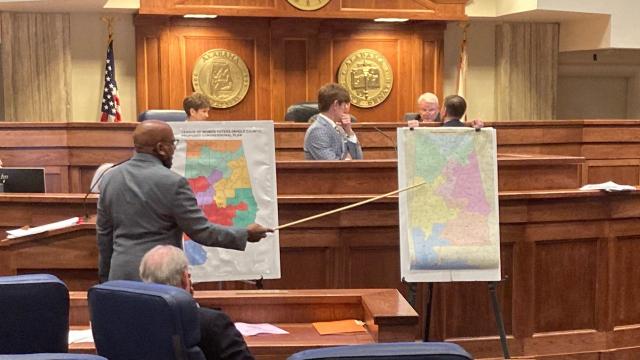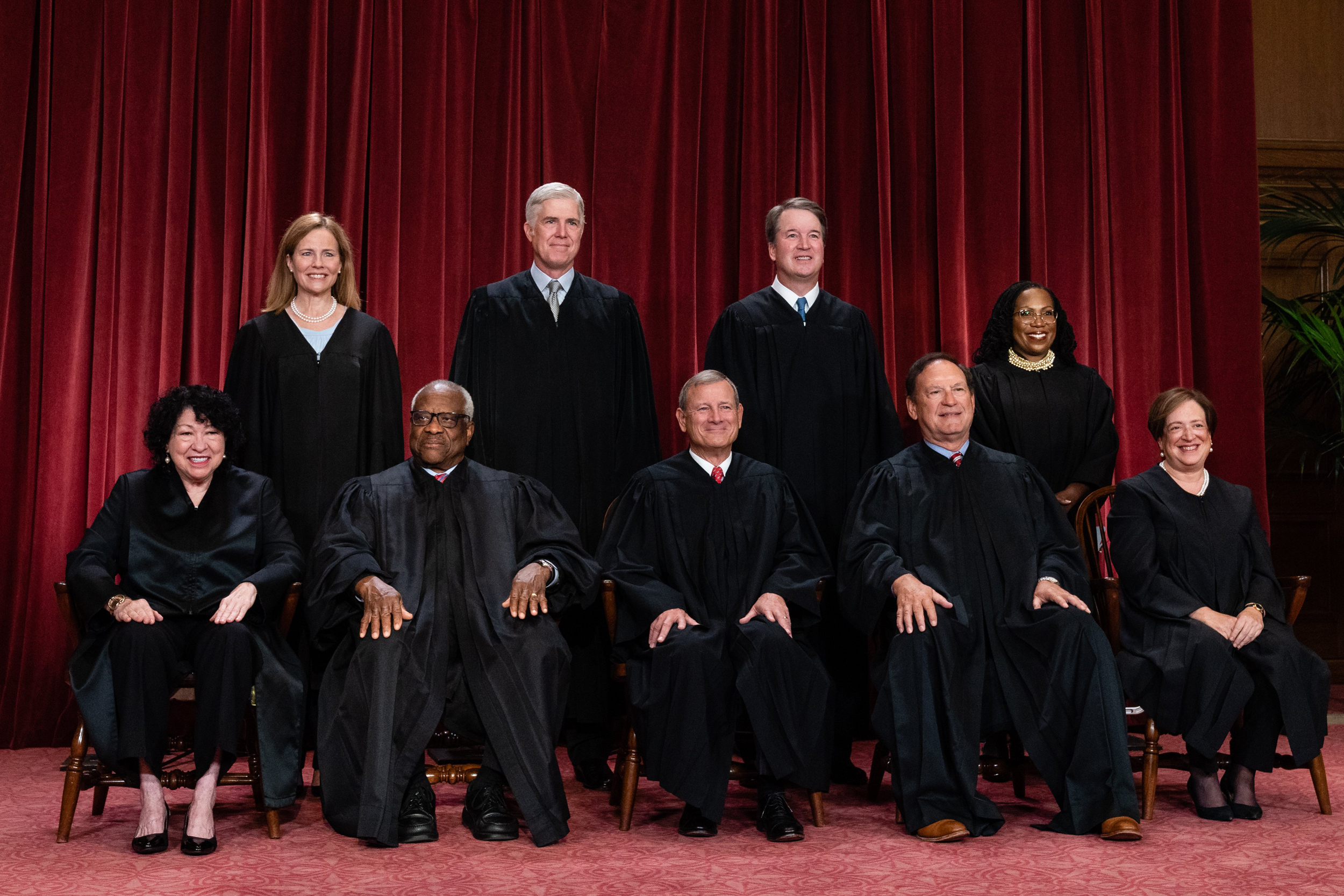
The Supreme Court of the United States (SCOTUS) wasn’t designed to be an unaccountable super-legislature of a handful of corporate lawyers who can simply override the decisions of the executive and legislative branches, but it has undoubtedly become so. The 6-3 conservative SCOTUS majority has become so entrenched in its power that, when addressing allegations of corruption, Justice Samuel Alito (R-Bush 43)* asserted that Congress has no jurisdiction over the Supreme Court (despite its budget being set by Congress, its size set by statute, and its members having to be first confirmed by the US Senate).
“Congress did not create the Supreme Court,” Alito told the Wall Street Journal editorial board in July. “I know this is a controversial view, but I’m willing to say it… No provision in the Constitution gives [Congress] the authority to regulate the Supreme Court – period.”
The monarchal attitude by justices like Alito, who hold lifetime appointments to the bench, were never elected to their positions, and gave themselves the power of sweeping judicial review in the 1803 Marbury v. Madison decision, make it seem as if SCOTUS is omnipotent. It may be tempting to fight back against such an all-powerful body of far-right extremists by ignoring it, as Alabama is currently doing, but that could lead to dangerous implications for the future as political seas change.
Alabama’s attitude toward SCOTUS has huge implications
In July, SCOTUS rejected Alabama’s Congressional redistricting map on the grounds that it disenfranchised the state’s Black voters, who were largely boxed into just one district in the entire state. It instructed Alabama’s Republican-dominated legislature to redraw a map in which Black voters were given at least two of Alabama’s seven districts (Black voters make up roughly 25% of Alabama’s electorate). But in direct defiance of the Supreme Court, Alabama Republicans – within hours of the deadline imposed by SCOTUS – sent back a map that included just one district for a majority of its Black voters. Governor Kay Ivey (R) signed off on the map, and a federal court will hold a hearing on the map on August 14.
“I’m ashamed of what we did here,” state representative Juandalynn Givan (D-Birmingham) said in regard to the new map. “We’ve chosen to outright, blatantly disobey the law and to further attempt and vote to bury the Voting Rights Act.”
To be clear, Alabama Republicans are absolutely disobeying the law in favor of racial disenfranchisement, all to serve the cause of further strengthening a radical far-right party’s political power. And if Alabama continues to ignore the Supreme Court, that could signal to others wishing to defy the court to ignore it as well, since the SCOTUS has no means of enforcing its rulings outside of the consent of the executive and legislative branches.
If Alabama Republicans continue to defy the court’s orders, SCOTUS could hold Gov. Ivey and Alabama’s GOP legislative leaders in contempt, but it’s unlikely any of them would be jailed for the offense. It’s far more likely that they would be hit with a minor fine, as former Kansas Secretary of State Kris Kobach (R) was in 2018, when he attempted to disenfranchise voters there and was ultimately fined a paltry $26,000 by a federal judge who found him in contempt.
The Supreme Court has just a small police force of just 189 officers designed primarily for regulating protests. This police force is just as incapable of arresting state lawmakers for contempt as it is of entering the White House and arresting the president for ignoring the court’s orders. If the court’s decisions were simply ignored, it would have no recourse to re-assert its authority. Even former Supreme Court Justice Stephen Breyer (D-Clinton) admitted in 2003 that governments respecting the court’s rulings was a “miracle.”
As University of Texas law professor Tara Leigh Grove pointed out in a 2019 essay for the Harvard Law Review, the Supreme Court’s only authority depends on its legitimacy. Grove defined legitimacy in three ways: Sociological legitimacy (whether or not the public views the court as legitimate), moral legitimacy (whether or not the court is perceived as a morally correct institution), and legal legitimacy (if the legal profession respects the way the court interprets laws). Contemporary metrics show that the court has lost legitimacy in all three of these categories. Chief Justice John Roberts is particularly prickly in regard to questions about the court’s legitimacy and has defended it vociferously when called into question. This suggests that the court’s perceived legitimacy is as tenuous now as it’s ever been.
An August 2023 Gallup poll found that just 40% of Americans approve of the Supreme Court, which is a historic low that has been held since September of 2021, when the court upheld a controversial abortion ban in Texas. The corruption exhibited by numerous SCOTUS justices in favoring billionaire benefactors like Harlan Crow and Paul Singer in numerous rulings, as well as the dismissive attitude those justices have towards accountability, suggests their moral legitimacy is at an all-time low. And the court’s recent ruling in favor of plaintiff Lorie Smith in the 303 Creative v. Elenis case – in which a conservative website designer refused to design a wedding website for a gay couple – was found to have been based on a fabricated claim. The supposed gay man, “Stewart,” who allegedly made the request, is actually a heterosexual man married to a woman, and says he never made any such request. One commentator referred to it as a “verdict in search of a case.” Given that the plaintiff had no standing, as she didn’t actually suffer an injury requiring relief, this brings the court’s legal legitimacy into question.
So what would happen if Congress and President Biden followed Alabama’s lead, viewed the court as an illegitimate body, and simply decided to ignore the Supreme Court’s rulings?
What if Democrats ignored SCOTUS?
In the US, the highest law of the land is the United States Constitution, which the SCOTUS is tasked with interpreting as it relates to cases it hears. Given this fact, there are numerous ways President Biden and a Democratic Congress could simply ignore the Roberts Court and drive a semi-truck through the openings the Constitution provides.
Even though the Supreme Court overturned the Roe v. Wade decision in 2022, paving the way for individual states to criminalize abortion once again, President Biden could ignore this. By directing his Department of Health and Human Services to acknowledge that pregnant individuals still have a fundamental right to terminate their pregnancies if they choose, and that abortion care falls under other healthcare procedures HHS is tasked with regulating, he could effectively make abortion legal again. Biden could even point to the Constitution’s supremacy clause – which states that federal law will always supersede state law when statutes are in contradiction with each other – as a reason to override individual states’ abortion bans.
The Citizens United v. FEC decision of 2010, which effectively made it legal for corporations to spend unlimited amounts of money influencing elections, could also be ignored in this way. Biden could instruct his Federal Election Commission to impose strict new regulations on corporate campaign contributions, arguing that the 14th Amendment only grants the rights of citizenship to individuals born in or naturalized in the US, and that corporations are legal entities with no such rights.
Regarding SCOTUS’ recent decision to not allow President Biden to cancel up to $20,000 in student debt per borrower, Biden could simply invoke Article II of the US Constitution, which states that the president has the responsibility to execute and enforce laws passed by Congress. Under this argument, he could state that the Higher Education Act of 1965 – in assigning jurisdiction over all federal student debt to the Secretary of Education – already grants the power of federal debt cancellation to the executive branch. Biden could then forgive all federal student loan debt by executive order, arguing that Article II gives him all the authority he needs to do so.
Delegitimizing the Supreme Court at our own peril
On one hand, this strategy could be framed not as a radical power-grab, but rather as simply re-orienting the court in a way similar to other western democracies, like Canada and the UK. In those countries, the supreme court serves as simply a place to hear final appeals challenged in lower courts for less consequential decisions. Those supreme courts are still able to issue advisory rulings, but these are instead viewed as non-binding opinions that those countries’ parliaments have the discretion of following or ignoring.
However, the nature of politics is the swing of the pendulum from left to right over a number of election cycles. Ignoring the Supreme Court’s rulings in this way could inevitably lead to an imbalance of power on the other side. If Republicans were to take back the presidency, both chambers of Congress, and enact laws in defiance of past Supreme Court decisions like Brown v. Board of Education (which ended segregation in public schools), Loving v. Virginia (which ended miscegenation laws), and Obergefell v. Hodges (which legalized same-sex marriage), the SCOTUS’ check on power would be sorely missed. This isn’t too far-fetched of a scenario; just last November, several dozen Republicans voted against a bill meant to protect both same-sex marriage and interracial marriage – including Senator Mitch McConnell (R-Kentucky) who is married to an Asian woman.
Rather than simply opting to ignore SCOTUS decisions, one potential solution would be for Congress to pass a bill regulating the Supreme Court in several ways: First, by imposing term limits (the Brennan Center for Justice laid out a proposal for staggered 18-year term limits) so justices can’t influence laws for decades, then by imposing a strict code of ethics so justices can’t be persuaded by lavish gifts and vacations by billionaires to rule in their favor. While the judicial review powers of the court would be maintained, such a measure would be a counter to Alito’s assertion that SCOTUS is unaccountable to Congress, and reinforce the system of checks and balances that true democracy depends on.
The Supreme Court’s current far-right partisan bias has provoked conversation about a number of solutions, including adding new justices, and even conversations about a Constitutional amendment to abolish the court entirely. But democracy depends on a separation of powers, so no one branch can ever become more powerful than the other two. The most effective solution may be not just the ethical regulations and term limits suggested in the aforementioned paragraph, but reforming the way we conduct presidential elections entirely.
(Stay tuned for part two of this article series, on how eliminating the electoral college could lead to a more balanced Supreme Court.)
Occupy.com has made the editorial decision to name the president who appointed each respective Supreme Court justice, along with their party affiliation, when mentioning a specific justice.
Carl Gibson is a freelance columnist whose work has been published in CNN, USA TODAY, the Guardian, the Washington Post, the Houston Chronicle, Barron’s, Business Insider, the Independent, and NPR, among others. Follow him on Bluesky @crgibs@bsky.social.












